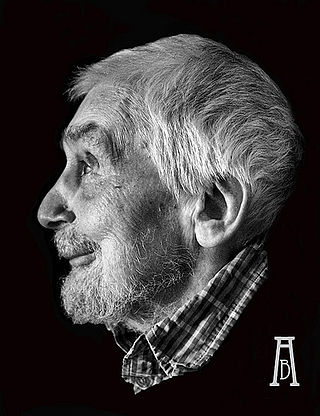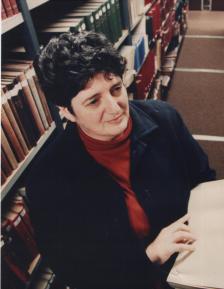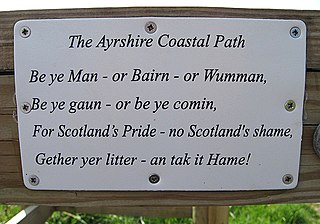
Christopher Murray Grieve, best known by his pen name Hugh MacDiarmid, was a Scottish poet, journalist, essayist and political figure. He is considered one of the principal forces behind the Scottish Renaissance and has had a lasting impact on Scottish culture and politics. He was a founding member of the National Party of Scotland in 1928 but left in 1933 due to his Marxist–Leninist views. He joined the Communist Party of Great Britain the following year only to be expelled in 1938 for his nationalist sympathies. He would subsequently stand as a parliamentary candidate for both the Scottish National Party (1945) and Communist Party of Great Britain (1964).

Edwin George Morgan was a Scottish poet and translator associated with the Scottish Renaissance. He is widely recognised as one of the foremost Scottish poets of the 20th century. In 1999, Morgan was made the first Glasgow Poet Laureate. In 2004, he was named as the first Makar or National Poet for Scotland.
Máirtín Ó Direáin was an Irish poet from the Aran Islands Gaeltacht. Along with Seán Ó Ríordáin and Máire Mhac an tSaoi, Ó Direáin was, in the words of Louis de Paor, "one of a trinity of poets who revolutionised Irish language poetry in the 1940s and 50s." According to a 1984 lecture by Desmond Egan, "Ó Direáin's genius stands revealed - to the extent that we must look abroad for poets with whom his achievement might best be compared; to Spain and Antonio Machado's sweet intensity; to Russia and Akhmatova; to Germany and the bittersweet music of Heinrich Heine."

A makar is a term from Scottish literature for a poet or bard, often thought of as a royal court poet.
Liz Lochhead Hon FRSE is a Scottish poet, playwright, translator and broadcaster. Between 2011 and 2016 she was the Makar, or National Poet of Scotland, and served as Poet Laureate for Glasgow between 2005 and 2011.

Kathleen Jamie FRSL is a Scottish poet and essayist. In 2021 she became Scotland's fourth Makar.
Stewart Conn is a Scottish poet and playwright, born in Hillhead, Glasgow. His father was a minister at Kelvinside Church but the family moved to Kilmarnock, Ayrshire in 1941 when he was five. During the 1960s and 1970s, he worked for the BBC at their offices off Queen Margaret Drive and moved to Edinburgh in 1977, where until 1992 he was based as BBC Scotland's head of radio drama. He was Edinburgh's first makar or poet laureate in 2002–05.

Shetland dialect is a dialect of Insular Scots spoken in Shetland, an archipelago to the north of mainland Scotland. It is derived from the Scots dialects brought to Shetland from the end of the fifteenth century by Lowland Scots, mainly from Fife and Lothian, with a degree of Norse influence from the Norn language, which is an extinct North Germanic language spoken on the islands until the late 18th century.
Hugh McMillan is a Scottish poet and short story writer.
James John (J.J.) Haldane Burgess was a Shetland historian, poet, novelist, violinist, linguist and socialist, a noted figure in Shetland's cultural history. His published works include Rasmie's Büddie, Some Shetland Folk, Tang, The Treasure of Don Andreas, Rasmie's Kit, Rasmie's Smaa Murr, and The Viking Path, the latter being translated into German. He was one of the Shetlanders who gave assistance to Jakob Jakobsen, in his researches into the Norn language in Shetland.
Dilys Rose is a Scottish fiction writer and poet. Born in 1954 in Glasgow, Rose studied at Edinburgh University, where she taught creative writing from 2002 until 2017. She was Director of the MSc in Creative Writing by Online Learning from 2012 to 2017. She is currently a Royal Literary Fellow at the University of Glasgow. Her third novel Unspeakable was published by Freight Books in 2017.
James King Annand MBE was a Scottish poet best known for his children's poems.

Jen Hadfield is a British poet and visual artist. She has published four poetry collections. Her first collection, Almanacs, won an Eric Gregory Award in 2003. Hadfield is the youngest female poet to be awarded the TS Eliot Prize, with her second collection, Nigh-No-Place, in 2008. Her fourth collection, The Stone Age, was selected as the Poetry Book Society choice for spring 2021 and won the Highland Book Prize, 2021.

John Glenday grew up in Monifieth.

Sheena Blackhall is a Scottish poet, novelist, short story writer, illustrator, traditional story teller and singer. Author of over 180 poetry pamphlets, 15 short story collections, 4 novels and 2 televised plays for children, The Nicht Bus and The Broken Hert. Along with Les Wheeler, she co-edits the Doric resource Elphinstone Kist, and has worked on the Aberdeen Reading Bus, as a storyteller and writer, also sitting on the editorial board for their children's publications in Doric, promoting Scots culture and language in the North East. In 2018 Aberdeen University awarded her the degree of Master of the University. In 2021 she was appointed SPL’s poetry ambassador for the Scots language.

Modern Scots comprises the varieties of Scots traditionally spoken in Lowland Scotland and parts of Ulster, from 1700.
Stella Sutherland was one of the Shetland writers of the later 20th and early 21st century. Best known for poetry in both English and Shetland dialect, she also contributed articles and short stories to local magazines, especially The New Shetlander.

Scots-language literature is literature, including poetry, prose and drama, written in the Scots language in its many forms and derivatives. Middle Scots became the dominant language of Scotland in the late Middle Ages. The first surviving major text in Scots literature is John Barbour's Brus (1375). Some ballads may date back to the thirteenth century, but were not recorded until the eighteenth century. In the early fifteenth century Scots historical works included Andrew of Wyntoun's verse Orygynale Cronykil of Scotland and Blind Harry's The Wallace. Much Middle Scots literature was produced by makars, poets with links to the royal court, which included James I, who wrote the extended poem The Kingis Quair. Writers such as William Dunbar, Robert Henryson, Walter Kennedy and Gavin Douglas have been seen as creating a golden age in Scottish poetry. In the late fifteenth century, Scots prose also began to develop as a genre. The first complete surviving work is John Ireland's The Meroure of Wyssdome (1490). There were also prose translations of French books of chivalry that survive from the 1450s. The landmark work in the reign of James IV was Gavin Douglas's version of Virgil's Aeneid.
William Hershaw is a Scottish poet, playwright, musician and Scots language activist.
Valerie Gillies is a Canadian-born poet who grew up in Scotland. She was the second Edinburgh Makar from 2005 to 2008. Gillies has written for literary and arts reviews, the theatre, and BBC radio and television, and has worked with visual artists and musicians. She has also taught creative writing extensively.









